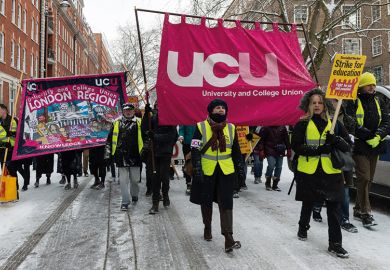On 22 February University and College Union members were celebrating the one-year anniversary of the USS pension strikes – historic action that stands as the most effective in shifting the ground that I have seen in 30 years.
This week, as members continue to digest the disappointing result of the higher education pay and equality ballot announced on Friday, comes the sad news that our general secretary Sally Hunt is stepping down due to ill health.
Without Sally, and the similarly determined former National Association of Teachers in Further and Higher Education leader Paul Mackney, there would have been no UCU. Both put aside personal interest to forge a union which, 12 years on, has significant political and industrial influence.
Managing the new union would have been a challenge for anyone. The union’s faction-driven electoral politics loom large in any big decision UCU takes, which is why, to me, Sally’s best moment was her building of the coalition for sustained strike action on USS in 2017.
I was there when Sally told Universities Superannuation Scheme branches and UCU staff that we needed a month of strikes if we were to stop the employers destroying the guaranteed pension. The intake of breath in the room was palpable, but members delivered and together we did save the guaranteed pension.
Last week’s ballot result has been much debated by UCU members already. From my perspective, the union sent out more than a million individual communications to members and the outstanding work of branches probably doubled that. Our activists and organising staff worked their backsides off knocking on tens of thousands of doors and phone banking.
The local “get the vote out” (GTVO) strategy of most branches in this ballot was significantly improved compared with the first ballot and the USS vote. The result, alas, was not.
We cannot ignore the impact of the Tories’ pernicious anti-union laws, nor should we discount the union’s efforts to overcome them. UCU’s GTVO strategy has improved ballot turnout from an average of 38 per cent before the Trade Union Act to 49 per cent since. So if it wasn’t for lack of trying, what was it?
One reason may be that the USS dispute is not yet fully resolved. Members are watching developments closely and there is little doubt that they are prepared to act again if benefits are threatened. Another is that in some institutions other priorities, such as fighting redundancies, dealing with financial scandals or breakdowns in governance loom large.
In my view, the issue goes deeper than that. There is no doubt that members want the union to take action to improve job security and reduce workload. Look at the substantial progress made in places such as The Open University with its landmark agreement to improve security for more than 4,000 casualised teachers.
But what members are not sufficiently clear about is what the UCU sector conference’s strategy is. While the sector conference that took the decision to re-ballot members passed many motions, the debates were almost all focused on short-term tactical questions such as whether to aggregate the ballot or its timing.
If the union is serious about replicating our USS success elsewhere, we need to discuss and agree our underlying, long-term strategy. I believe one of the most important legacies of Sally’s leadership will be her commission on effective industrial action.
The commission recommended a new approach to disputes based on long-term planning, consultation to establish key issues, prioritisation of resources and gradual mobilisation running up to ballot – in essence a strategic approach that starts with the membership.
The prize for agreeing a common agenda across the union is substantial, but it means that we need to talk to each other rather than lock horns about what went wrong. We also need to talk to, rather than insult, those who chose not to vote.
Like many in the union, I believe we need serious action to persuade employers to address workload, casualisation and pay inequalities.
However, to achieve this we need a vote as big as USS and a strategy just as clear. That means persuading a good chunk of those non-voters that we have a credible plan. Put simply, without a non-sectarian discussion with our membership about how we reach our shared goals, we simply won’t get there.
I believe that the best response to the ballot result is to reach out to each other and create a plan to change the failed employment model that every member can support.
After all, as Monty Python’s Life of Brian famously showed, while the various factions and sects argued the toss about the rights and wrongs of old battles, the Romans ruled uninterrupted. If we want to win, we need to lift our heads up and talk to each other.
Matt Waddup is head of policy at the University and College Union.
Register to continue
Why register?
- Registration is free and only takes a moment
- Once registered, you can read 3 articles a month
- Sign up for our newsletter
Subscribe
Or subscribe for unlimited access to:
- Unlimited access to news, views, insights & reviews
- Digital editions
- Digital access to THE’s university and college rankings analysis
Already registered or a current subscriber?




